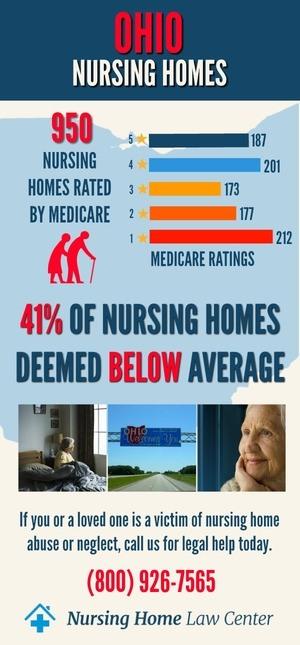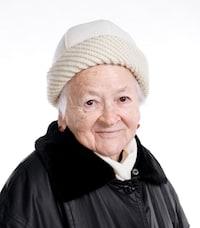The Nursing Home Law Center is committed to providing the legal resources necessary to hold negligent facilities accountable.
Ohio Nursing Home Abuse Lawyer
Elder neglect is a heartbreaking reality that affects many nursing home residents in Ohio nursing homes and assisted living facilities. Families entrust assisted living facilities with the care of their loved ones, expecting them to receive proper care and attention. Unfortunately, some facilities fail to uphold these expectations.
Family members often feel powerless when they suspect nursing home negligence, unsure of how to protect their loved ones and hold responsible parties accountable. This is where specialized personal injury lawyers step in.
A knowledgeable nursing home neglect attorney can help you understand your legal options and guide you through the process of seeking compensation for your loved one’s injuries and suffering. This specialized guidance is particularly vital in Northeast Ohio, where high facility density can lead to increased oversight issues. If you suspect mistreatment in Cuyahoga County, a Cleveland Nursing Home Abuse Lawyer from our team can investigate the facility’s history and ensure that local safety standards are being strictly followed.
Why Hire Nursing Home Law Center
Nursing Home Law Center is dedicated to obtaining justice and fair compensation for those affected by nursing home neglect. Our team of nursing home attorneys has strong expertise in handling these sensitive cases and securing substantial settlements and verdicts for our clients.
We leave no stone unturned in our investigations, ensuring that every aspect of the abuse, from medical costs to emotional suffering, is thoroughly addressed. With our extensive knowledge of nursing home abuse claims, we tackle the challenges with determination and work relentlessly to safeguard your rights. Our firm provides comprehensive support to families throughout Central Ohio who are dealing with the aftermath of facility negligence. Working with a Columbus, OH Nursing Home Abuse Lawyer ensures that you have a dedicated advocate who understands the specific regulatory environment of the state capital and is prepared to challenge even the largest corporate care providers.
Types of Cases Handled by Our Ohio Nursing Home Abuse Lawyers

Elder abuse refers to any intentional harm inflicted on senior residents in assisted living facilities. Our nursing home abuse lawyers handle a wide range of cases, including the following:
Physical Abuse
Physical abuse occurs when nursing home residents suffer bodily harm at the hands of caregivers or staff members. This violent act may involve hitting, slapping, or unnecessary use of restraints, causing severe injuries or even death.
Mental and Emotional Abuse
Psychological abuse is another common form of mistreatment in nursing homes, often involving threats, intimidation, verbal insults, or isolation of residents. Such abuse can lead to severe mental health issues, including anxiety and depression.
Sexual Abuse
Sexual assault is a heinous violation of a resident’s dignity and rights. Non-consensual sexual contact is often committed by staff or other residents and may go unnoticed due to the victim’s inability to communicate the assault.
Medical Malpractice
Medical malpractice in nursing homes can take many forms, from untreated bed sores (pressure sores) to medication errors. Bed sores develop when nursing staff fail to reposition immobile residents, causing painful wounds that can lead to infections.
Medication errors are often the leading cause of wrongful death, such as administering the wrong prescription drugs or incorrect dosages.
Negligence
Nursing home negligence can manifest as poor hygiene, malnutrition, dehydration, or even elopement, where a resident wanders away from the facility unsupervised.
Financial Abuse
Financial exploitation is another form of abuse in nursing homes, where elderly residents are manipulated into giving away money or assets. Sometimes, medical staff may steal directly from residents or misuse their personal information for financial gain.
Wrongful Death
Wrongful death occurs when abuse or neglect of an elderly resident leads to their untimely passing. Our legal team works tirelessly to hold negligent facilities accountable for these preventable fatalities, ensuring families receive the justice and compensation they deserve.
Understanding Your Legal Rights

Both federal and state laws protect nursing home residents and ensure their safety, dignity, and well-being while living in nursing facilities.
The Nursing Home Reform Act of 1987 is one of the most important federal laws governing the rights of residents in nursing home facilities. This law mandates that residents have the right to be free from abuse, neglect, and restraints and to receive proper care and attention.
The Ohio Department of Health oversees the licensing and regulation of nursing facilities to ensure compliance with state laws designed to protect residents. Under Ohio law, nursing home residents have the right to live in a safe environment, receive proper care, and be treated with respect.
The Ohio Nursing Home Residents’ Bill of Rights specifically outlines these rights, including protection against abuse or neglect, the right to privacy, and the ability to participate in decisions about their care.
Eligibility to File a Nursing Home Abuse Claim
When nursing homes fail to comply with federal and state laws, it is necessary to take legal action. Victims can file claims themselves or, in cases where the victim cannot do so, by a family member or a legal representative. If the abuse or neglect results in the wrongful death of a resident, the deceased’s estate may file a claim on their behalf. Determining who has the legal standing to pursue a case can be complex, but is a necessary step in the recovery process. For those seeking justice in Southwest Ohio, a Cincinnati Nursing Home Abuse Lawyer can help clarify these rights and build a strong legal strategy to address the unique challenges presented by Hamilton County’s legal landscape.
Liability in Nursing Home Neglect and Abuse Cases

In many cases of nursing home abuse, several parties may be held accountable for the harm caused to residents.
Nursing Home Staff
Nursing home staff members are often the most direct perpetrators of nursing home neglect. In some cases, staff may also be liable for failing to report abuse they witness.
Nursing Facility
The nursing home itself can be liable for abuse when it fails to provide adequate care or maintain a safe environment. Issues like understaffing, inadequate training, or poor hiring practices that put residents at risk could be involved.
Administrators and Management
Nursing home administrators and management are responsible for monitoring staff and ensuring they follow proper care protocols. When they fail in these duties, they can be held liable for creating or allowing unsafe conditions.
Contractors and Third-Party Providers
Some nursing homes outsource nursing care or food preparation services to third-party providers. If these contractors fail to deliver proper services—such as administering the wrong medications or providing poor hygiene care—they can also be held liable for the harm caused to residents.
Pharmaceutical Companies
Pharmaceutical companies may be liable if their drugs were improperly labeled, leading to misuse or incorrect administration. This liability can stem from providing incorrect dosage instructions or failing to include proper warnings, especially in cases where medication errors lead to injury or death.
Owners or Corporations
Nursing homes are often part of larger corporate entities that oversee multiple facilities. These corporations can be held responsible if corporate policies or budget cuts contribute to understaffing, poor training, or inadequate care standards.
Common Signs of Elder Abuse Among Nursing Home Residents
By staying alert to the warning signs of elder abuse, a family member or legal representative can take swift action to prevent further abuse and seek justice with the help of an experienced nursing home lawyer.
- Unexplained bruises, broken bones, cuts, or burns
- Frequent hospital visits
- Sudden withdrawal from social activities
- Unusual fear or anxiety, especially around certain staff members
- Changes in communication, such as a reluctance to speak
- Unexplained injuries in the genital or anal area
- Torn or stained undergarments
- Infections or sexually transmitted diseases (STDs)
- Untreated bed sores (pressure sores)
- Dehydration or malnutrition
- Medication errors, such as incorrect dosages or missed prescriptions
- Unexplained withdrawals or charges on bank accounts
- Missing personal items, such as jewelry or cash
- Sudden changes in wills or financial documents
- Unpaid bills despite having sufficient funds
- Unsanitary living conditions, such as soiled sheets or dirty rooms
- Wandering or elopement
The worst-rated nursing homes in Ohio include [1]:
| Anchor Lodge Nursing Home Inc | Anderson, The |
| Arbors at Marietta | Arbors at Milford |
| Arbors at Pomeroy | Arbors at Stow |
| Arbors at Woodsfield | Aristocrat Berea Healthcare and Rehabilitation |
| Astoria Place of Barnesville | Astoria Place of Cambridge |
| Astoria Place of Silverton | Aventura at Shiloh Springs |
| Aventura at West Park | Ayden Healthcare of Toledo |
| Beavercreek Health and Rehab | Beeghly Oaks Center for Rehabilitation & Healing |
| Bella Terrace Rehabilitation and Nursing Center | Brewster Convalescent Center |
| Bryan Healthcare and Rehabilitation | Candlewood Healthcare and Rehabilitation |
| Canfield Healthcare Center | Canton Christian Home |
| Capital City Gardens Rehabilitation and Nursing Center | Carecore at Lima LLC |
| Carecore at Mary Scott | Catherine’s Care Center, Inc |
| Chamberlin Healthcare Center | Columbus Colony Elderly Care |
| Community Skilled Health Care | Continuing Healthcare at Adams Lane |
| Continuing Healthcare at Cedar Hill | Continuing Healthcare at Forest Hill |
| Continuing Healthcare at Willow Haven | Continuing Healthcare of Shadyside |
| Country Court | Country Lane Gardens Rehab & Nursing Center |
| Crestwood Care Center | Divine Rehabilitation and Nursing at Sylvania |
| Divine Rehabilitation and Nursing at Toledo | Dixon Healthcare Center |
| Eastbrook Healthcare Center | East Ohio Regional Hospital Long Term Care |
| Embassy of Lebanon | Embassy of Lyndhurst |
| Embassy of Marion | Embassy of Newark |
| Embassy of Winchester | Embassy of Woodview |
| Fairfax Health Care Center | Forest Hills Healthcare Center |
| Garden Court Nursing and Rehabilitation Center | Gardens of Mayfield Village |
| Geneva Center for Rehabilitation and Nursing | Geriatric Center of Mansfield |
| Glendora Health Care Center | Grand, The |
| Greenbriar Center | Hanover Healthcare Center |
| Harbor Healthcare of Ironton | Harmony Center for Rehabilitation and Healing |
| Harrison Pavilion Care Center | Heatherdowns Rehab & Residential Care Center |
| Hennis Care Centre of Dover | Highland Square Nursing and Rehabilitation |
| Kent Healthcare and Rehabilitation | Kenwood Terrace Healthcare Center |
| Kirtland Rehabilitation & Care | Lakeridge Villa Health Care Center |
| Laurels of Mount Vernon, The | Laurels of Norworth, The |
| Legacy Dublin | Legacy Marietta |
| Legacy Mentor | Legacy Miamisburg |
| Legacy Twinsburg | Legacy Westerville |
| Legends Care Rehabilitation and Nursing Center | Liberty Nursing Center of Colerain Inc |
| Louisville Gardens Care Center | Luxe Rehabilitation and Care Center |
| Majestic Care of Fairfield LLC | Majestic Care of Middletown LLC |
| Majestic Care of Whitehall | Mayfair Village Nursing Care Center |
| McKinley Health Care Center LLC | Meadowbrook Care Center |
| Mentor Woods Skilled Nursing and Rehabilitation | Milcrest Nursing Center |
| Momentous Health at Vandalia | Monroe County Operating Inc |
| New Lexington Healthcare and Rehabilitation Center | Normandy Manor of Rocky River |
| Oak Grove Manor | Oasis Center for Rehabilitation and Healing |
| Otterbein Gahanna | Otterbein New Albany |
| Park Center Healthcare and Rehabilitation | Park Terrace Nursing and Rehabilitation Center |
| Parkview Northwest Healthcare Center | Park Vista Nursing & Rehab by McAre Health |
| Perrysburg Healthcare and Rehabilitation Center | Pleasant Ridge Healthcare Center |
| Point Place Healthcare and Rehabilitation Center | Riverside Landing Nursing and Rehabilitation |
| Rocky River Gardens Rehab and Nursing Center | Rose Lane Nursing and Rehabilitation |
| Solon Pointe at Emerald Ridge | Springfield Nursing & Independent Living |
| St Clare Commons | Steubenville Country Club Manor |
| Suburban Healthcare and Rehabilitation | Chateau at Mountain Crest Nursing & Rehab Center, The |
| Colony Healthcare Center, The | Laurels of Chagrin Falls, The |
| Laurels of Gahanna, The | Pavilion Rehabilitation and Nursing Center, The |
| Sanctuary at Tuttle Crossing, The | Three Rivers Healthcare Center |
| Village at the Greene | Walnut Creek Nursing Center |
| Wesleyan Village | Westmoreland Place |
| Whitehouse Country Manor | Willow Park Convalescent Home |
| Wyant Woods Healthcare Center |
What to Do If You Suspect Nursing Home Abuse
If you suspect that your loved one is being abused or neglected in a nursing home, it’s important to act quickly to protect them. Here are the key steps to take:
Call 911 If There Is Immediate Danger
If you believe your loved one is in immediate physical danger, call local authorities by dialing 911. Emergency services can then step in to ensure the resident’s safety and provide necessary medical care.
Report the Abuse to the Nursing Facility Administrator or Management
Notify the nursing home’s administrator or management about your concerns. They are required to investigate the issue and take corrective action. Keep detailed records of your conversations, including the names of the individuals you speak with and any responses or actions taken.
File a Complaint with Your Local Ombudsman’s Office
Every state, including Ohio, has a Long-Term Care Ombudsman Program, which advocates for residents of nursing homes and assisted living facilities. The Ombudsman’s office can investigate abuse claims, help resolve issues, and protect residents’ rights.
Contact a Nursing Home Abuse Lawyer
To protect your loved one’s legal rights and pursue compensation for their suffering, contact experienced nursing home injury lawyers. A lawyer can guide you through the legal process, investigate the abuse, and help hold responsible parties accountable.
The Cost of Hiring an Ohio Nursing Home Abuse Lawyer
At Nursing Home Law Center, we understand that families dealing with nursing home abuse are already facing emotional and financial challenges. That’s why we offer our legal services on a contingency fee basis.
This arrangement means you won’t have to worry about paying any upfront fees or out-of-pocket costs. We only get paid if we recover compensation for you and your loved one.
You Have Limited Time to Take Legal Action in Ohio
In Ohio, there is a limited time to file a claim for nursing home elder abuse or nursing home negligence due to the state’s statute of limitations. Generally, you have two years from the date of the abuse or the discovery of the harm to take legal action. While the standard two-year window applies to many personal injury claims, medical malpractice issues in a care setting may fall under a much stricter one-year deadline in some circumstances. Consulting an Akron Nursing Home Abuse Lawyer immediately after noticing signs of neglect can help Summit County families preserve evidence and ensure their claim is filed before these critical deadlines pass. Failing to file within this timeframe can prevent you from pursuing compensation or holding the responsible parties accountable.
Contact an Ohio Nursing Home Abuse Attorney Today!
At Nursing Home Law Center, our experienced team of nursing home abuse lawyers is dedicated to fighting for the rights of residents who have suffered from elder abuse or nursing home negligence. With a proven track record of handling complex nursing home neglect cases, we are committed to securing justice and fair compensation for victims and their families. Our attorneys are available to provide immediate assistance and a free case review to help you protect your loved ones. Families in Northwest Ohio can rely on a Toledo Nursing Home Abuse Lawyer from our firm to provide the compassionate and aggressive representation necessary to hold negligent facilities in Lucas County accountable.
Call us at (800) 926-7565 or fill out our contact form for a free consultation.
References: [1] Medicare

